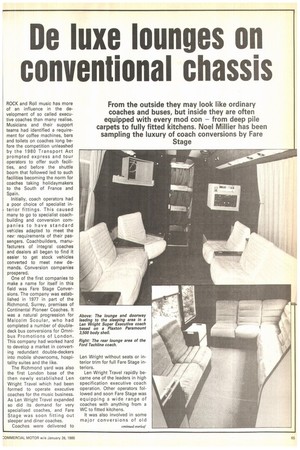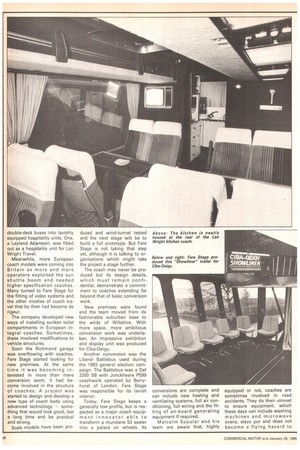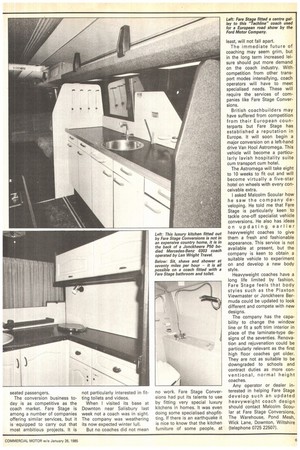De luxe lounges on conventional chassis
Page 67

Page 68

Page 69

If you've noticed an error in this article please click here to report it so we can fix it.
From the outside they may look like ordinary coaches and buses, but inside they are often equipped with every mod con — from deep pile carpets to fully fitted kitchens. Noel Millier has been sampling the luxury of coach conversions by Fare Stage
ROCK and Roll music has more of an influence in the development of so called executive coaches than many realise. Musicians and their support teams had identified a requirement for coffee machines, bars and toilets on coaches long before the competition unleashed by the 1980 Transport Act prompted express and tour operators to offer such facilities, and before the shuttle boom that followed led to such facilities becoming the norm for coaches taking holidaymakers to the South of France and Spain.
Initially, coach operators had a poor choice of specialist in terior fittings. This caused many to go to specialist coachbuilding and conversion com panies to have standard vehcles adapted to meet the nev: requirements of their pas sengers. Coachbuilders, manu facturers of integral coaches and dealers all began to find it easier to get stock vehicles converted to meet new demands. Conversion companies prospered.
One of the first companies to make a name for itself in this field was Fare Stage Conver sions. The company was established in 1977 in part of the Richmond, Surrey, premises of Continental Pioneer Coaches. It was a natural progression for Malcolm Scoular, who had completed a number of doubledeck bus conversions for Omni bus Promotions of London.
This company had worked hard to develop a market in convert ing redundant double-deckers into mobile showrooms, hospitality suites and the like.
The Richmond yard was also the first London base of the then newly established Len Wright Travel which had been formed to operate executive coaches for the music business.
As Len Wright Travel expanded so did its demand for very specialised coaches, and Fare Stage was soon fitting out sleeper and diner coaches. Coaches were delivered to Len Wright without seats or interior trim for full Fare Stage interiors.
Len Wright Travel rapidly became one of the leaders in high specification executive coach operation. Other operators followed and soon Fare Stage was equipping a wide range of coaches with anything from a WC to fitted kitchens.
It was also involved in some major conversions of old double-deck buses into lavishly equipped hospitality units. One, a Leyland Atiantean, was fitted out as a hospitality unit for Len Wright Travel.
Meanwhile, more European coach models were coming into Britain as more and more operators exploited the sun shuttle boom and needed higher specification coaches. Many turned to Fare Stage for the fitting of video systems and the other niceties of coach travel that by then had become de rigeur.
The company developed new ways of installing sunken toilet compartments in European integral coaches. Sometimes, these involved modifications to vehicle structures.
Soon the Richmond garage was overflowing with coaches. Fare Stage started looking for new premises. At the same time it was becoming interested in more than mere conversion work; it had become involved in the structure of coaches. A project was started to design and develop a new type of coach body using advanced technology — something that would look good, last a long time and be practical and strong.
Scale models have been pro
duced and wind-tunnel tested and the next stage will be to build a full prototype. But Fare Stage is not taking that step yet, although it is talking to organisations which might take the project a stage further.
The coach may never be produced but its design details, which must remain confidential, demonstrate a commitment to coaches extending far beyond that of basic conversion work.
New premises were found and the team moved from its fashionable suburban base to the wilds of Wiltshire. With more space, more ambitious conversion work was undertaken. An impressive exhibition and display unit was produced for Ciba-Geigy.
Another conversion was the Liberal Battlebus used during the 1983 general election campaign. The Battlebus was a Daf 2300 SB with Jonckheere P599 coachwork operated by Berryhurst of London. Fare Stage was responsible for its lavish interior.
Today, Fare Stage keeps a generally low profile, but is respected as a major coach equipment innovator able to transform a mundane 53 seater into a palace on wheels. Its conversions are complete and can include new heating and ventilating systems, full air conditioning, full wiring and the fitting of on-board generating equipment if required.
Malcolm Scoular and his team are aware that, highly equipped or not, coaches are sometimes involved in road accidents. They do their utmost to ensure equipment, which these days can include washing machines and microwave ovens, stays put and does not become a flying hazard to seated passengers.
The conversion business today is as competitive as the coach market. Fare Stage is among a number of companies offering similar services, but it is equipped to carry out that most ambitious projects. It is not particularly interested in fitting toilets and videos.
When I visited its base at Downton near Salisbury last week not a coach was in sight. The company was weathering its now expected winter lull.
But no coaches did not mean no work. Fare Stage Conversions had put its talents to use by fitting very special luxury kitchens in homes. It was even doing some specialised shopfitting. If there is an earthquake it is nice to know that the kitchen furniture of some people, at least, will not fall apart.
The immediate future of coaching may seem grim, but in the long term increased leisure should put more demand on the coach industry. With competition from other transport modes intensifying, coach operators will have to meet specialised needs. These will require the services of companies like Fare Stage Conversions.
British coachbuilders may have suffered from competition from their European counterparts but Fare Stage has established a reputation in Europe. It will soon begin a major conversion on a left-hand drive Van Hool Astromega. This vehicle will become a particularly lavish hospitality suite cum transport cum hotel.
The Astromega will take eight to 10 weeks to fit out and will become virtually a five-star hotel on wheels with every conceivable extra.
I asked Malcolm Scoular how he saw the company developing. He told me that Fare Stage is particularly keen to tackle one-off specialist vehicle conversions. He also has ideas on updating earlier heavyweight coaches to give them a fresh and fashionable appearance. This service is not available at present, but the company is keen to obtain a suitable vehicle to experiment on and develop a new body style.
Heavyweight coaches have a long .life limited by fashion. Fare Stage feels that body styles such as the Plaxton Viewmaster or Jonckheere Bermuda could be updated to look different and compete with new designs.
The company has the capability to change the window line or fit a soft trim interior in place of the laminate-type designs of the seventies. Renovation and rejuvenation could be particularly relevant as the first high floor coaches get older. They are not as suitable to be downgraded to schools and contract duties as more conventional, normal height coaches.
Any operator or dealer interested in helping Fare Stage develop such an updated heavyweight coach design should contact Malcolm Scoular at Fare Stage Conversions, The Warehouse, Pond Mesh, Wick Lane, Downton, Wiltshire (telephone 0725 22507).








































































































